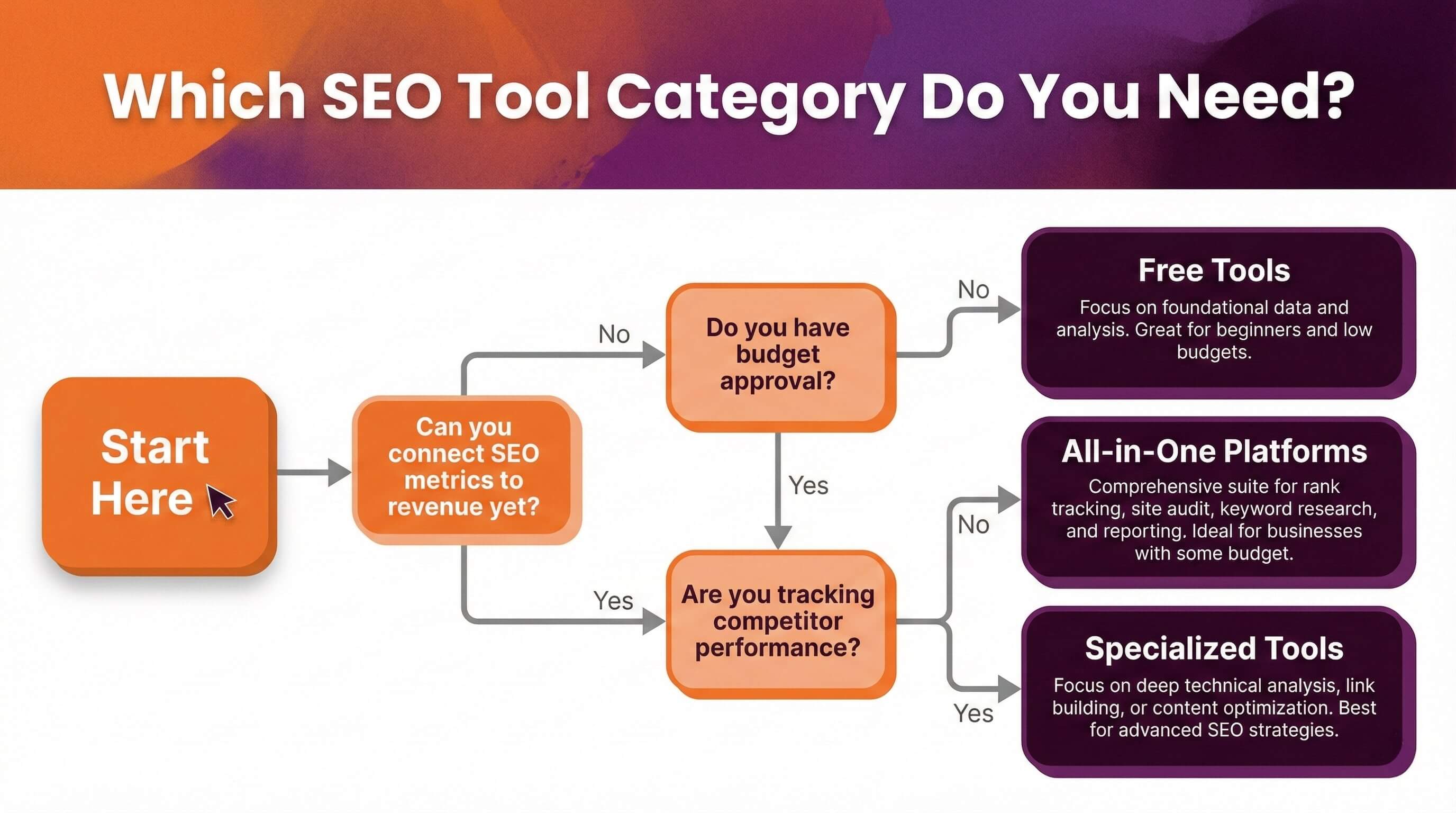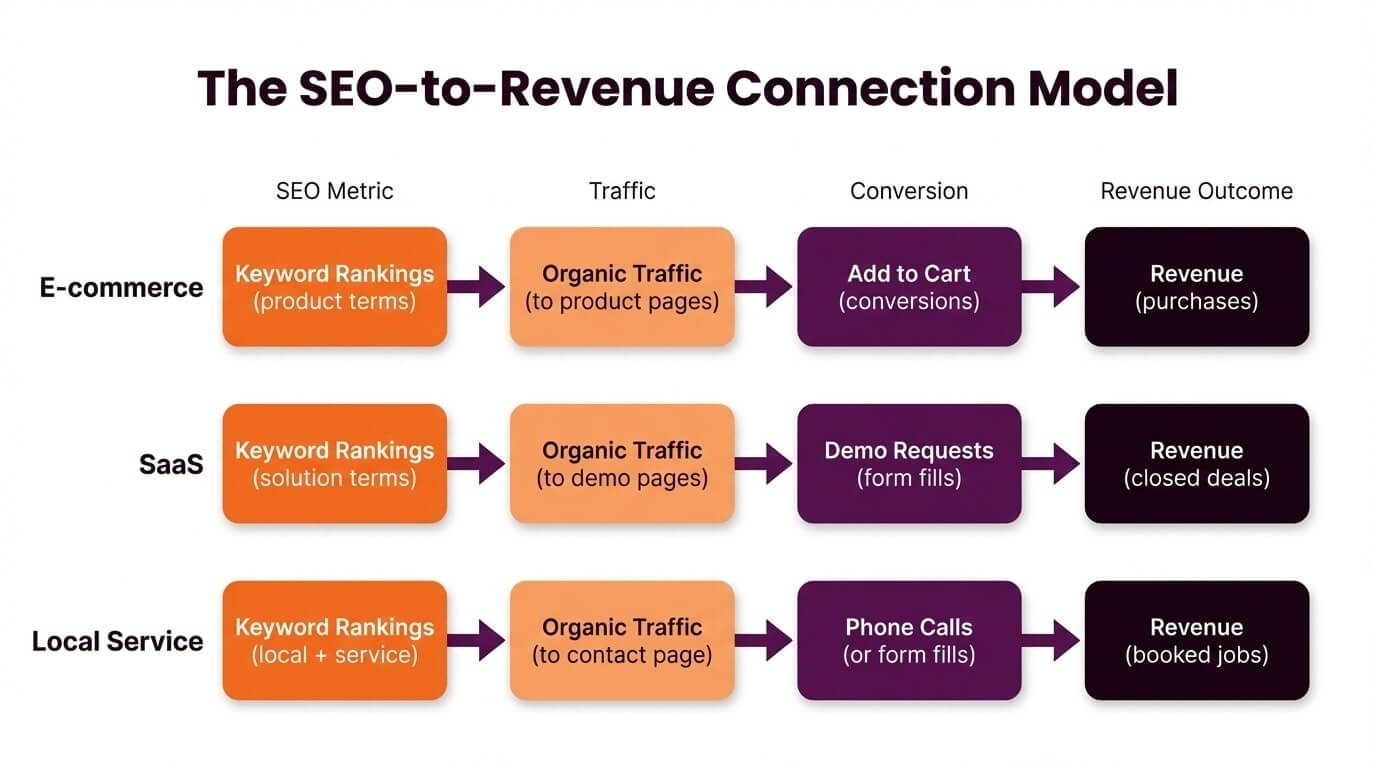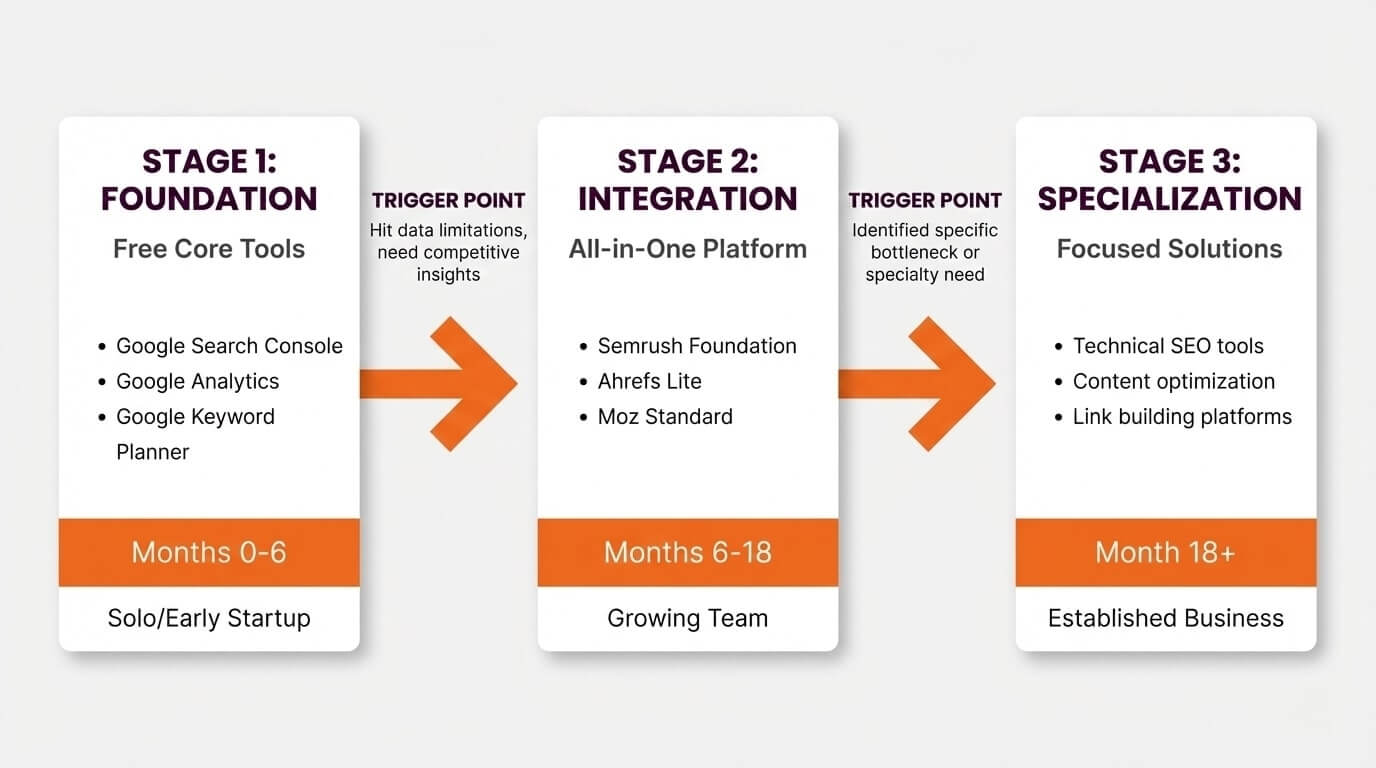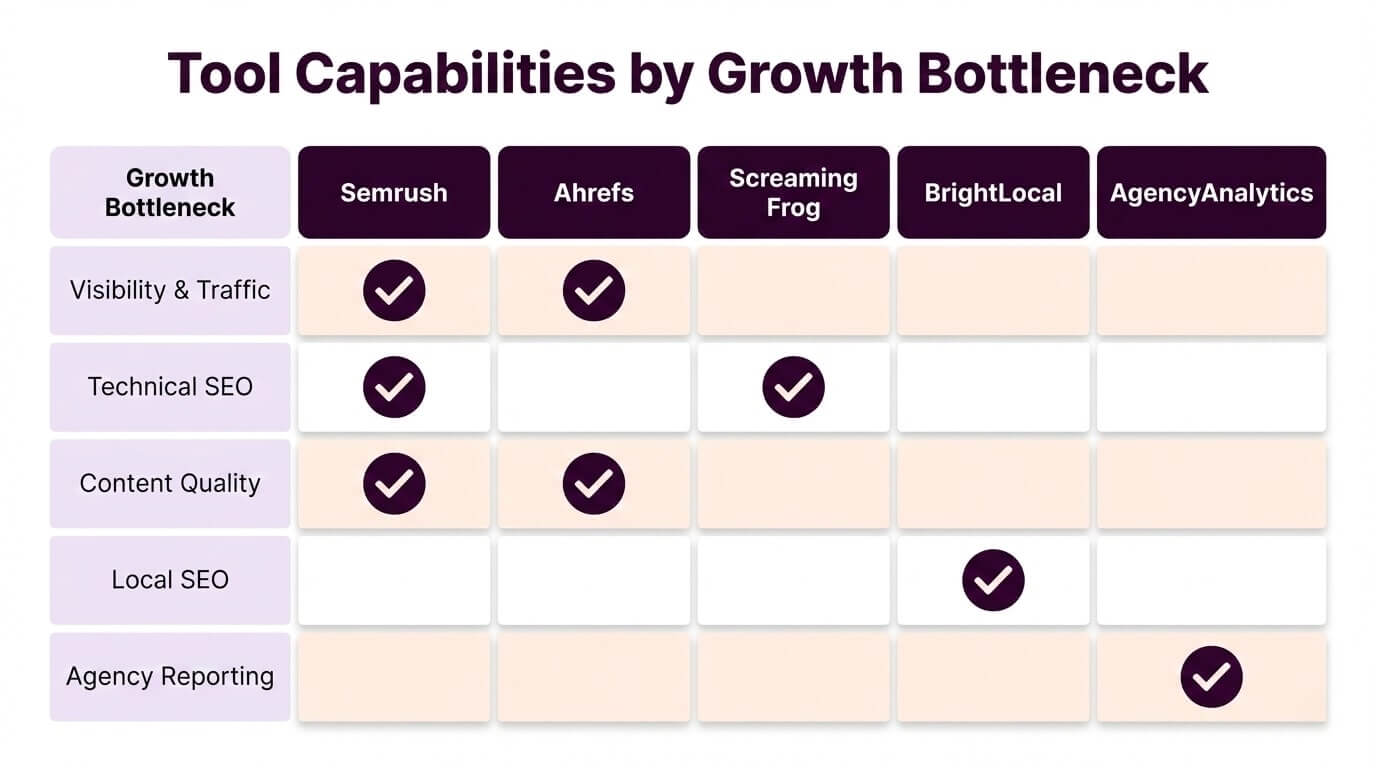
How to Choose Your Best SEO Analysis & Reporting Tools
Most people choose SEO analysis and reporting tools based on feature lists and price tags. Actually, the right tool depends on what helps you prove and improve ROI—because if you can't connect your SEO work to revenue, the tool's capabilities don't matter.
SEO reporting tools fall into three categories, each serving a different part of the revenue equation.
- All-in-one suites like Semrush, Ahrefs, and SE Ranking provide keyword research, rank tracking, backlink analysis, and site audits—they're built for teams that need comprehensive visibility across the entire SEO funnel.
- Specialized tools like Screaming Frog (technical SEO), Clearscope (content optimization), and SEOMonitor (campaign tracking and forecasting) solve specific bottlenecks when general-purpose tools aren't enough.
- Free platforms like Google Search Console, Google Analytics, and Google Business Profile deliver the foundational data you need to track performance and connect SEO activity to conversions—particularly valuable when you're starting out or need to justify tool investment.
The right tool depends on where revenue is actually blocked—not which dashboard looks best or which tool has the most features.

Before You Choose a Tool, Ask Yourself: What SEO Metrics Connect to Revenue?
If you skip this question, no tool will save you.
Here's the truth: most marketers open a reporting platform, glance at metrics like impressions, clicks, or rankings, and call it a day. Research shows that connecting SEO metrics to business outcomes is critical for demonstrating marketing ROI. But if you can't explain how those numbers contribute to leads, sales, or conversions, your reports won't hold up in a boardroom.
The fix? Flip your approach. Before you choose software, answer this: "What metric links our SEO activities to actual revenue?" That answer becomes the foundation for all your reporting decisions.
"When we report results, we must do so in business terms. Rather than quoting percentage increases in traffic, we need to say what that traffic represented, such as how many people matched our target buyer personas, how many converted into something valuable, and what that means in financial or strategic terms." — Dan Taylor, Search Engine Journal
For example, if your business generates revenue through demo requests, the connecting metric might be organic traffic to demo pages or conversions from branded search terms. Once you identify that correlation, every chart and KPI in your SEO analysis and reporting tools should ladder back to it.

Quick GSC Exercise
Start with a hands-on test in Google Search Console (GSC):
- Identify your top-converting pages—where revenue-driving actions actually happen.
- Check each page's organic traffic and rankings.
- Look for the keywords bringing in visitors to those pages.
- Treat rankings not as bragging rights, but as capacity indicators, or how much room there is to increase qualified traffic to your highest-value pages. Data from search behavior studies shows that higher rankings correlate with exponentially greater click-through rates.
By reverse-engineering from conversions, you turn rankings into strategic levers instead of vanity metrics.
When to Graduate from Free to Paid Tools
The magic moment comes when you've squeezed every drop of insight from Google Search Console and realize you need to look beyond your own site.

The Trigger
Move to paid SEO analysis and reporting tools when you want to:
- Benchmark against competitors
- Discover new keyword opportunities
- Track historical trends beyond 16 months
- Analyze backlinks or content gaps
Free tools like GSC show your current performance but not your potential. Paid tools unlock the external data that reveals where new growth lives.
The ROI Perspective
Investing in SEO reporting software makes sense only after you've proven a clear link between rankings and revenue. Once that's established, every new insight—whether it's a competitor gap, link opportunity, or keyword cluster—has measurable value.
Tool Recommendations by Your Growth Bottleneck

When you've decided to move into paid tools, the next step isn't figuring out which platform has the most features. It's identifying what's actually holding your SEO performance back.
No single "best" SEO reporting tool exists for everyone. The right choice depends on what's limiting your growth right now, whether that's visibility, technical performance, content quality, local reach, or reporting efficiency.
Here's how to find your fit.
Foundational Reporting: Visibility & Traffic
While Google Search Console gives you valuable visibility into keyword positions, click-through rates, and top-performing pages—all straight from Google's own data—there comes a point when you'll need to dig deeper. When you're ready to go beyond the basics, here are the best tools for foundational reporting on visibility and traffic.
- Semrush: Semrush is your all-in-one SEO powerhouse, offering keyword research, site audits, rank tracking, competitor analysis, and backlink reports in one interface. The "My Reports" feature lets you combine multiple data sources into custom dashboards, while AI-powered summaries translate metrics into plain language. Agencies can white-label reports using the Agency Growth Kit add-on.
- Ahrefs: Comparable pricing: Ahrefs is the go-to tool for backlink and keyword data. Ahrefs' crawler rivals Google's in scale, making it ideal for anyone who needs detailed backlink profiles or competitor insights.
- SE Ranking: SE Ranking is a budget-friendly option with many of the same features as Semrush and Ahrefs: rank tracking, audits, backlink monitoring, and client reporting. It's perfect for small businesses or agencies that need depth without enterprise pricing.
When to switch: Graduate from GSC when you've hit its limits and need competitor data, keyword discovery, or long-term tracking beyond 16 months.
Technical SEO Bottlenecks
If your content isn't ranking despite optimization, the issue might be crawlability, site structure, or speed. Google's technical SEO documentation identifies these infrastructure elements as ranking factors that impact content visibility. Here are the SEO analysis and reporting tools that can help with that.
- Screaming Frog SEO Spider: Screaming Frog is the gold standard for technical audits. It crawls your website to detect broken links, redirect chains, duplicate content, and metadata issues. It's a must-have if you need granular diagnostics.
- Sitebulb: A visual, cloud-based alternative to Screaming Frog, Sitebulb delivers beautiful, prioritized reports that non-technical stakeholders can understand—making it ideal for agencies presenting technical data to clients.
Why go beyond all-in-one tools: While Semrush and Ahrefs include basic technical audits, dedicated crawlers provide deeper, faster analysis when infrastructure—not content—is the constraint.
Content Quality & Optimization
If your technical SEO checks out but rankings still lag, your bottleneck might be content quality or topical coverage.
- Clearscope: Clearscope uses NLP (natural language processing) to analyze the top-ranking pages for your keyword, surfacing recommended terms, structure, and readability levels. It's like an SEO content GPS that shows you what your piece is missing.
- MarketMuse: An AI-driven platform that identifies topic gaps across your site, MarketMuse helps you build comprehensive authority around themes. It's especially useful for large content teams producing at scale.
Why use them: Tools like these give your writers data-backed briefs that align with search intent and ensure every new article contributes to your site's topical strength—and not just word count.
Local SEO Visibility
If you serve local markets, tracking "near me" searches and map pack rankings is non-negotiable. Our recommended tool? BrightLocal.
- BrightLocal: Tailored specifically for local search, BrightLocal monitors Google Business Profile (GBP) insights, local pack performance, and citation consistency. The white-label report options make it a dream for agencies managing multiple local clients.
Why specialized tools matter: Local SEO depends on signals (reviews, citations, NAP consistency) that general platforms can't track deeply enough. BrightLocal fills that gap.
Agency & Client Reporting Automation
If your biggest pain point is time, not data access, automation tools save hours.
- Whatagraph: The fastest way to turn multi-platform data into branded client reports, Whatagraph's pre-built templates and scheduling automation make it a top pick for agencies juggling multiple accounts.
- AgencyAnalytics: Built for simplicity and SEO-specific reporting, Agency Analytics combines rank tracking, backlink data, and integrations with Google Analytics and Ads in white-label dashboards.
- DashThis: DashThis is a straightforward alternative with fewer bells and whistles but an incredibly easy setup. Ideal for small teams prioritizing clarity over customization.
Why these matter: These platforms don't give you new data. They automate how you present it. That's crucial when your team's time is better spent optimizing campaigns than building PowerPoints.
Key Takeaways: Picking the Right Tool for You
You've seen how each tool fits a different stage of growth. But before you start trialing software, it helps to zoom out and make sure you're choosing strategically—not just reactively. Keep these guiding principles in mind as you pick the right SEO reporting tools for your goals.
- Start with purpose, not tools: Define your revenue-correlated metrics first; otherwise, every report will look impressive but say nothing.
- Let bottlenecks guide your choices: Foundational visibility? Go GSC → Semrush. Technical roadblocks? Screaming Frog or Sitebulb. Weak content? Clearscope or MarketMuse. Local visibility? BrightLocal. Agency overload? Whatagraph or AgencyAnalytics.
- Graduate strategically: Free tools are perfect until you hit the data ceiling. Then—and only then—invest in platforms that unlock the next level of insight.
- Remember: Pretty dashboards don't drive revenue, but clarity does: The best SEO reporting tools simplify complex data into stories that move budgets, guide strategy, and prove impact.
Take the Next Step
Start by diving into Google Search Console. It's the best way to ground your reporting in real data. Then, explore a few of the tools above. Most offer free trials, so you can poke around, compare features, and see which one fits your workflow.
If you're unsure where to start, we're here to help. Our team can guide you through setup, connect your data sources, and make sure your reports actually move the needle.
At the end of the day, the best SEO reporting tool is the one that helps you make smarter, faster decisions. Choose intentionally, experiment with what works for your team, and remember: clarity always beats complexity.
share this article
Explore Similar Posts
Get In touch
We’d love to share how digital marketing can help elevate your brand — and your business’s bottom line.





